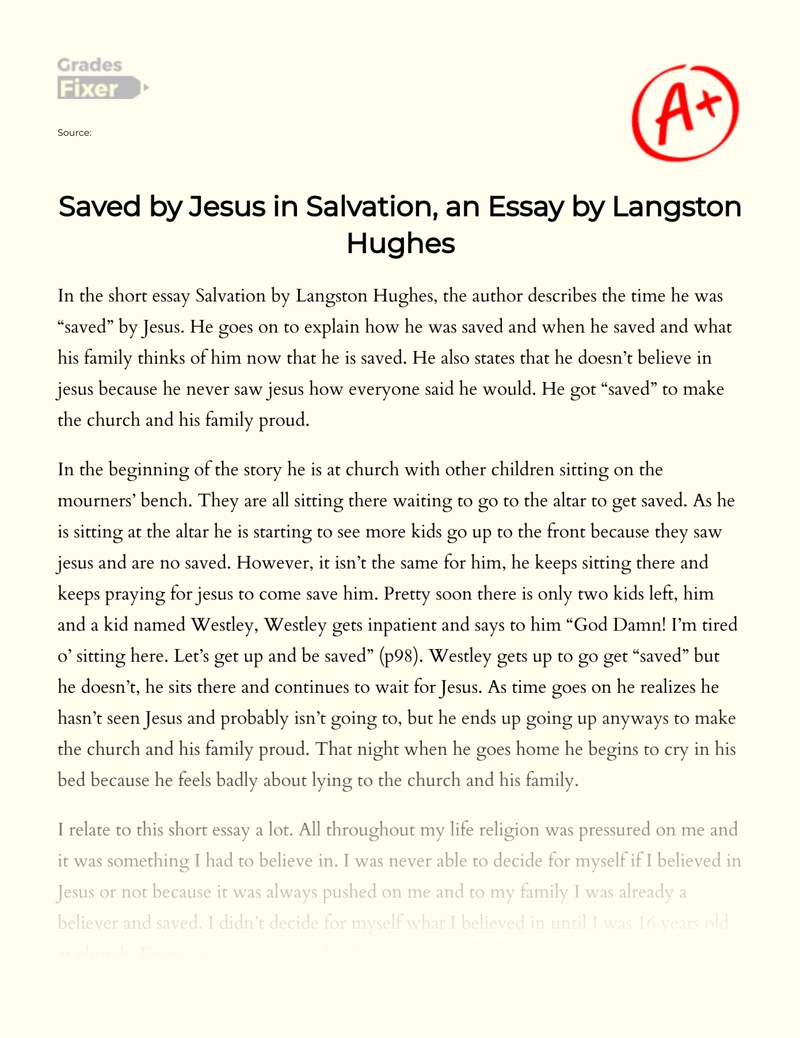The Model Short Story
On "salvation" by langston hughes.

Matthew Sharpe

“Salvation” is the third chapter of Langston Hughes’s memoir The Big Sea , but this two-page tour de force of prose is also a compact and complete story. Here are five things I like about it:
- The control of time. As the story opens, time breezes along in the weeks leading up to the revival meeting at twelve-year-old Langston’s church. Time then slows down paragraph by paragraph until, as Langston’s decisive moment approaches, it creeps.
- The control of space. Sometimes we see close-ups from twelve-year-old Langston’s point of view of “old women with jet-black faces and braided hair, old men with work-gnarled hands”; other times we see long shots, as if from up in the church’s rafters: “Suddenly the whole room broke into a sea of shouting. Waves of rejoicing swept the place.” And, as the church does, the author imbues with enormous significance the ten feet of space between the front row of pews and the altar, which the boy must cross to be saved.
- The doubleness of the narrator. His diction and sensibility move fluidly back and forth between the man’s and the boy’s.
- Polyphony. Not only the two Langstons’, but his Auntie Reed’s, the preacher’s, and his friend Westley’s voices are heard, as is the voice of the church via the liturgy.
- Irony. The verbal irony of the title, “Salvation,” is a kind of shorthand for the dramatic irony of the plot, wherein the more lost young Langston feels, the more his fellow congregants are convinced they are saving him.

“Salvation” by Langston Hughes
I was saved from sin when I was going on thirteen. But not really saved. It happened like this. There was a big revival at my Auntie Reed’s church. Every night for weeks there had been much preaching, singing, praying, and shouting, and some very hardened sinners had been brought to Christ, and the membership of the church had grown by leaps and bounds. Then just before the revival ended, they held a special meeting for children, “to bring the young lambs to the fold.” My aunt spoke of it for days ahead. That night I was escorted to the front row and placed on the mourners’ bench with all the other young sinners, who had not yet been brought to Jesus.
My aunt told me that when you were saved you saw a light, and something happened to you inside! And Jesus came into your life! And God was with you from then on! She said you could see and hear and feel Jesus in your soul. I believed her. I had heard a great many old people say the same thing and it seemed to me they ought to know. So I sat there calmly in the hot, crowded church, waiting for Jesus to come to me.
The preacher preached a wonderful rhythmical sermon, all moans and shouts and lonely cries and dire pictures of hell, and then he sang a song about the ninety and nine safe in the fold, but one little lamb was left out in the cold. Then he said: “Won’t you come? Won’t you come to Jesus? Young lambs, won’t you come?” And he held out his arms to all us young sinners there on the mourners’ bench. And the little girls cried. And some of them jumped up and went to Jesus right away. But most of us just sat there.
A great many old people came and knelt around us and prayed, old women with jet-black faces and braided hair, old men with work-gnarled hands. And the church sang a song about the lower lights are burning, some poor sinners to be saved. And the whole building rocked with prayer and song.
Still I kept waiting to see Jesus.
Finally all the young people had gone to the altar and were saved, but one boy and me. He was a rounder’s son named Westley. Westley and I were surrounded by sisters and deacons praying. It was very hot in the church, and getting late now. Finally Westley said to me in a whisper: “God damn! I’m tired o’ sitting here. Let’s get up and be saved.” So he got up and was saved.
Then I was left all alone on the mourners’ bench. My aunt came and knelt at my knees and cried, while prayers and song swirled all around me in the little church. The whole congregation prayed for me alone, in a mighty wail of moans and voices. And I kept waiting serenely for Jesus, waiting, waiting – but he didn’t come. I wanted to see him, but nothing happened to me. Nothing! I wanted something to happen to me, but nothing happened.
I heard the songs and the minister saying: “Why don’t you come? My dear child, why don’t you come to Jesus? Jesus is waiting for you. He wants you. Why don’t you come? Sister Reed, what is this child’s name?”
“Langston,” my aunt sobbed.
“Langston, why don’t you come? Why don’t you come and be saved? Oh, Lamb of God! Why don’t you come?”
Now it was really getting late. I began to be ashamed of myself, holding everything up so long. I began to wonder what God thought about Westley, who certainly hadn’t seen Jesus either, but who was now sitting proudly on the platform, swinging his knickerbockered legs and grinning down at me, surrounded by deacons and old women on their knees praying. God had not struck Westley dead for taking his name in vain or for lying in the temple. So I decided that maybe to save further trouble, I’d better lie, too, and say that Jesus had come, and get up and be saved.
So I got up.
Suddenly the whole room broke into a sea of shouting, as they saw me rise. Waves of rejoicing swept the place. Women leaped in the air. My aunt threw her arms around me. The minister took me by the hand and led me to the platform.
When things quieted down, in a hushed silence, punctuated by a few ecstatic “Amens,” all the new young lambs were blessed in the name of God. Then joyous singing filled the room.
That night, for the first time in my life but one for I was a big boy twelve years old – I cried. I cried, in bed alone, and couldn’t stop. I buried my head under the quilts, but my aunt heard me. She woke up and told my uncle I was crying because the Holy Ghost had come into my life, and because I had seen Jesus. But I was really crying because I couldn’t bear to tell her that I had lied, that I had deceived everybody in the church, that I hadn’t seen Jesus, and that now I didn’t believe there was a Jesus anymore, since he didn’t come to help me.
“Salvation” from The Big Sea by Langston Hughes. Copyright © 1940 by Langston Hughes. Copyright renewed 1968 by Arna Bontemps and George Houston Bass. Reprinted by permission of Hill and Wang, a division of Farrar, Straus and Giroux, LLC. www.fsgbooks.com
Langston Hughes (1902-1967) was a poet, novelist, playwright, columnist, memoirist, and short story writer. The author of more than 30 books and a dozen plays, he was extremely influential during the Harlem Renaissance and in the decades beyond; he also had a profound influence on a younger generation of writers, including Paule Marshall and Alice Walker. “Salvation” is taken from his memoir, The Big Sea .
About this series
In The Model Short Story, acclaimed authors choose a short story and discuss its importance to them and how it has assisted them in their own writing practice.
Discover Our Fiction, Essays & More

Biking Home

Remnants of My Homeland

A Raised Eyebrow

Falling into the Culture of In-Between

The Story of the Skipping Stone

San and Bert

All the Buttons

Public Park Therapy

An Excerpt from Brad Kessler's North

An Excerpt from Myriam J. A. Chancy's What Storm, What Thunder

As They Imagine Us on Summer Nights

A Letter to Mama

Recalcitrance

Clairvoyance

The Thing in the Wall

The Pumpkin

Floor Meditations

Skeleton Love
“Salvation” by Langston Hughes Literature Analysis Essay
Introduction.
The interpretation of the term salvation can take different dimension depending on certain aspects such as one’s background or age. Children, for instance, have their own understanding of religion and salvation as explicated by Langston in his literal understanding of the term salvation.
His inadequate understanding of the term resulted to an unwilling salvation process as a way of pleasing church members and his friend, which left him doubt on whether he received the real salvation. This document, therefore, is going to, extensively, analyze Hughes’s salvation scenario, in order to achieve a clear understanding.
In as much as it is fundamental to embrace salvation by accepting the lord almighty (Jesus Christ) as the sole savior, liberator or protector of all beings, it is also necessary to analyze and understand the process through which individual receive salvation as exemplified by Langston Hughes’s salvation experience.
By analyzing the article on “salvation” by Hughes, it is undoubtedly clear that Hughes never received salvation, despite being part of the salvation prayers held at the church. However, several factors contributed to Hughes’s situation of never receiving salvation, which includes his misunderstanding of the salvation process.
Hughes understood the term salvation in a literal perspective, instead of getting the deeper meaning of the term. He thought that when one receives salvation, he or she must physically observe Jesus Christ coming to his rescue. His understanding followed various explications by his aunt and other elderly individuals, whereby they claimed that one must see and feel the presence of Jesus Christ while receiving salvation.
In addition to his limited understanding ability, her aunt’s inadequate explanation of salvation also significantly contributed to Hughes’s literal thoughts of the salvation process. Hughes’s aunt should have given a detailed explication so that Hughes comprehends salvation process adequately and not in a literal perspective.
This would have helped Hughes to receive salvation in a comfortable and acceptable manner, rather than to act in pretense. Moreover, it would have also helped the young lad to not to, unwillingly, deceive the entire congregation that he wanted to receive salvation.
Conversely, it is also not fair to, completely, blame her aunt’s description, since Hughes was young and could not adequately understand the inner meaning of the salvation process. Whether Hughes’s aunt could have deeply explained the meaning of the salvation process or not, it is highly likely, that Hughes could have misunderstood the whole process. This is because of his tender age, which limits his understanding capacity.
Aside from the factors that contributed to Hughes misunderstanding of the salvation process, it is also clear that Hughes’s decision of receiving salvation had some influence from the church congregation and his friend. This, therefore, meant that Hughes decision of receiving salvation was not his own will, but rather a way of pleasing the congregation and his friend. In other words, Hughes never received real salvation.
Hughes is a young lad who misunderstood the salvation process thus making him question whether he received salvation. He argues that he never literally saw Jesus Christ in the process of getting salvation; thus, he never received salvation. His misguided thoughts about salvation, however, are due to a number of reasons.
Some of the aspects or factors include his tender age and his aunt’s inadequate explanation of the term salvation. His limited capacity of giving the term a deeper meaning also played a central role in Hughes’s misunderstanding of the term salvation.
- Chicago (A-D)
- Chicago (N-B)
IvyPanda. (2020, April 24). "Salvation" by Langston Hughes Literature Analysis. https://ivypanda.com/essays/salvation-by-langston-hughes-literature-analysis/
""Salvation" by Langston Hughes Literature Analysis." IvyPanda , 24 Apr. 2020, ivypanda.com/essays/salvation-by-langston-hughes-literature-analysis/.
IvyPanda . (2020) '"Salvation" by Langston Hughes Literature Analysis'. 24 April.
IvyPanda . 2020. ""Salvation" by Langston Hughes Literature Analysis." April 24, 2020. https://ivypanda.com/essays/salvation-by-langston-hughes-literature-analysis/.
1. IvyPanda . ""Salvation" by Langston Hughes Literature Analysis." April 24, 2020. https://ivypanda.com/essays/salvation-by-langston-hughes-literature-analysis/.
Bibliography
IvyPanda . ""Salvation" by Langston Hughes Literature Analysis." April 24, 2020. https://ivypanda.com/essays/salvation-by-langston-hughes-literature-analysis/.
- Langston Hughes and Black Elite
- Langston Hughes' and Emily Dickinson's Poems
- Spirit in the Dark: Langston Hughes
- "Fences" by August Wilson Literature Analysis
- “The Yellow Wallpaper” by Charlotte Perkins Gilman Literature Analysis
- Literature - Persepolis: The Story of a Childhood by Marjane Satrapi
- The Things They Carried by Tim O'Brien - Literature Analysis
- I Know Why the Caged Bird Sings, the Novel by Maya Angelou
Friday, May 10, 2024

djn003's blog
Just another Morningside.edu Blogs site
- Sample Page
- Passport/Intro. to Religion
- Uncategorized
Salvation Purpose and Audience
August 26, 2011 by Drew Filed under Passport/Intro. to Religion
12 Comments
Langston Hughes wrote “Salvation” as a part of his biography to show a huge event in his childhood that changed his life forever. He did not want to just express the feelings he had during the event; he wanted to show what and who had changed his life. Hughes wasn’t necessarily criticizing his aunt and other adults in the passage. He of course did not agree with what they were doing, but that wasn’t the major point of his narration. He showed how the pressure of adults has such a huge impact on a child’s life. Every human has the natural inclination to conform, but children especially want to conform. With as much pressure as Langston had on him, there was no way he could not conform. Langston also showed how different generations do not understand each other. The adults pressed the children to accept Jesus thinking the natural occurrence would take place, but they did not realize that the children would conform so easily even if they had not accepted or seen Jesus. You can see the effect of the pressure in the passage when there were only two boys left on the bench, Langston and Westley. Westley said, “God damn! I’m tired o’ sitting here. Let’s go up and be saved.” Westley went up in front of the church and was “saved.” He wasn’t really saved, but the pressure from the congregation got to the child. The same basic thing happened to Langston eventually. Young children simply look to appease their elders. Of course these children were going to conform even if they did not accept Jesus with that much pressure.
Lagston Hughes was by far one of the most influential writers of the 20th century. His work is full of depth and meaning. Such an interesting exploration of these important issues.
A sweater is usually put on a child when the parent feels chilly.
Do you want my website?
Hey I was just reading your website on my Pantech Phone and I was thinking about how well it will work on the new ipad thats coming out. Fleeting thought…. Anyway thanks!
I can see that you are an expert in this area
Even though I didn’t receive a business degree, I actually enjoyed learning about business economics.
This site on smartphone is not so good like on laptop. Please, correct it…
Please let me know if you’re looking for a article author for your site. You have some really great posts and I believe I would be a good asset. If you ever want to take some of the load off, I’d absolutely love to write some articles for your blog in exchange for a link back to mine. Please shoot me an e-mail if interested. Many thanks!
Fun article, I actually benefited from reading it, keep doing all the good work.
Many thanks for the insightful article. I found it very insightful, keep up the great posts.
Comfortabl y, the article is in reality the sweetest on this notable topic. I concur with your conclusions and also will eagerly look forward to your coming updates. Simply just saying thanks can not simply be sufficient, for the fantasti c clarity in your writing. I will certainly correct away grab your rss feed to stay privy of any kind of updates. De lightful work and also much success in your business endeavors!
Its seldom that I feel compelled to comment on articles, but youre material is contentworthy. Thank you for being so conscientious about what you write.
Recent Posts
- Honors-Palin, Clinton Sexism
- Internet’s effect on social interactions
- Randomness in Life
- Honors-Obama Higher Education
- Music and Effects on Politics and Society
- February 2012
- January 2012
- December 2011
- November 2011
- October 2011
- September 2011
- August 2011
- Documentation
- Suggest Ideas
- Support Forum
- WordPress Blog
- WordPress Planet
Copyright © 2024 · All Rights Reserved · Church theme by StudioPress · Powered by WordPress · Log in
"djn003's blog" is proudly powered by WordPress MU running on Morningside.edu Blogs . It is protected by Akismet Create a new blog and join in the fun!
Poetry & Poets
Explore the beauty of poetry – discover the poet within
What Is The Theme Of Salvation By Langston Hughes

Exploring the Meaning of Salvation by Langston Hughes
Langston Hughes’ poem “Salvation” is one of his most acclaimed poems, and one of the most noteworthy pieces of American literature of the 20th century. The poem primarily paints a picture of childhood, the complex relationship between a church and a child, and the process of dealing with difficult issues of faith. This article will explore the many overarching themes of the poem, and the deeper understanding of childhood which is woven throughout it.
The poem follows a young boy as he recounts his journey in finding religion, as well as the feelings of dishonesty and need for approval that drove him. Hughes begins by introducing the child’s life, noting his peers and interest in the church. Interestingly, the narrator cannot consider himself a follower of the same faith his peers partake in. Hughes states that the child’s family looks for salvation, not just for their own needs, but for their child’s future. Something “strong from God” is hoped for. Here, Hughes brings up the most crucial element of his poem: the process of finding religion.
What follows is a powerful scene in which the boy stands in front of the preacher, ready to accept the idea of salvation. However, his attempt at embracing faith is not successful due to the presence of a powerful fear deep within him. Hughes illustrates the inaction and confusion that the young man faces, and reflects the feeling of being lost that many readers will be familiar with. This fear grounds him to the present: the boy is unable to fully let go of his old life, and he begins to doubt his ability to save himself. Hughes notes that his voice fails at the climactic moment, when he is asked to stand and profess faith to a crowd.

This moment also reveals Hughes’ underlying message in the poem: religion as a path to developing identity. Here, Hughes shifts the focus from finding something external – in this case, salvation – to uncovering something internal: the child’s own understanding and acceptance of faith. By using language such as “the cross forgotten”, Hughes connotes that the boy must forget who he was before Christianity and begin anew. This is done, the poem seems to suggest, in order to make room for a new consciousness to be formed, in order to progress.
At the end of the poem, Hughes paints a clear picture of the boy’s inner turmoil and distress. He notes that the boy sat there until his face grew wet with tears, a sign of the deep sorrow and despair that had engulfed him. Here, Hughes is capturing the pain of disruption and rebuilding that comes with transformation. Hughes speaks of loved ones and friends giving in to temptation, supporting the idea that religious experience may set one on a different path than those around them, taking them further away from those they know and love.
In conclusion, Hughes’ poem is a lyrical and profound exploration of the complex themes of faith and identity. By portraying a child’s attempt to embrace faith and to ultimately come to terms with his or her own inner transformation, Hughes brings forth a rare insight on the power of religion to form and shape one’s life.
The Impact Of Salvation By Langston Hughes On American Society
Published in 1940, Langston Hughes’s poem “Salvation” was received with both admiration and criticism. For many, Hughes had lifted the veil surrounding Jesus and revealed the human emotions associated with wanting to experience Christianity. Hughes broke with traditional church teachings and instead focused on the individuality of the spiritual journey of a child. Through his words, readers came to understand that Christianity does not have to be a rigid, dogma-filled religion, but rather allows one to understand it in a more personal, meaningful way. Hughes’s insight has had a lasting and powerful effect on the way American society views Christianity, and “Salvation” has gone on to become a classic of American literature.

The poem’s exploration of faith and the idea of personal transformation resonated strongly with a post-World War II America. At a time when many were searching for spiritual meaning, Hughes was offering a much-needed respite. His poem not only speaks of an individual’s struggle with faith, but it encourages readers to reflect on their own relationship with religion. By emphasizing individualism and emphasizing the importance of finding one’s own relationship to faith, the impact of “Salvation” is still felt in our society today.
The poem’s impact was so extensive that it led to the formation of various organizations such as the Birmingham Civil Rights Museum and the Langston Hughes Society. These organizations honor Hughes’s life and works, while bringing attention to injustices still felt today in society. “Salvation” is often seen as a rallying call for individuals to embrace the beauty of diverse faiths and to embrace religion in its many manifestations, even those which challenge comfort zones.
Langston Hughes’s writing impacts readers today because of its ability to inspire fresh insights about one’s faith. His work encourages readers to explore and to find comfort in different interpretations of Christianity, as well as to find strength in their own spirituality. As society evolves and faith continues to be an integral part of many cultures, Hughes’s writing will remain an important part of the literary canon and his insights on faith will live on in our society.
The Significance Of Poetic Narratives Explored In Salvation By Langston Hughes
At first glance, Langston Hughes’s poem “Salvation” may appear to be merely a tale about a young African American boy’s discovery of religion. Upon closer examination, however, “Salvation” is a poetic narrative that is rife with broader cultural and political implications. Through this poem, Hughes explores the complex social and religious identities of Americans. The poem’s exploration of faith and identity serves as a powerful analysis of what it means to be American in modern-day society.

One significant implication of “Salvation” is the poem’s exploration of racial identity in American society. African American religion has traditionally served as an expression of personal faith, as well as an assertion of racial pride and solidarity. By depicting an African American boy’s search for salvation and struggle to embrace Christianity, the poem speaks to racial identity and the importance of faith in building an individual sense of community and belonging. Hughes is emphasizing the ability of faith to translate into political and social action, which was a powerful statement for African Americans in the 1930s and militates for a continued relevance today.
The poem also paints a vivid image of religion as a tool for personal development and identity formation. Hughes’s depiction of a young man struggling to find his own faith speaks to the power of faith in shaping who we are and forming new meanings for our lives. By embracing diversity and finding strength in newfound ideas, Hughes is emphasizing the value of religion as a means of self-discovery and transformation. By conveying the pain and uncertainty of a man’s spiritual path, the poem is a powerful reminder of the importance of exploring faith in search of individual understanding.
In Hughes’s poem, faith is a complex and ever-evolving process of personal exploration. The poem encourages readers to embrace their own spiritual journeys, no matter how difficult or challenging they may be. By exploring the internal effects of faith, the poem speaks to the power of poetic narratives to provide support, understanding, and inspiration in times of need.
The Representation Of Religion In Salvation By Langston Hughes
The role of religion in “Salvation” by Langston Hughes is one of the most powerful and compelling literary devices used in the poem. With intense themes of identity and inner transformation, Hughes uses his poem to explore the complexities of faith and its importance in our lives. Through the poem, Hughes creates an image of religion as both a source of joy and a burden, thus highlighting its personal and emotional significance.

One significant portrayal of religion in the poem is the importance of faith in self-discovery. Through the narrator’s internal struggle, Hughes conveys the idea that religion can be a powerful tool for identity formation. As the boy endeavours to embrace faith, he begins to question his own beliefs and understandings, leading to an internal journey of exploration. Hughes emphasizes the idea that faith can and should be a personal experience, thus encouraging individuals to embrace the complexity of religious life.
Hughes also expands on the idea of faith as an emotional, rather than an intellectual, experience. By introducing the element of fear, Hughes is showcasing the inner struggle of faith as something that is deeply personal and emotional. The boy’s fear is a reminder that accepting faith can be a taxing experience, and one which challenges traditional beliefs and values. Hughes thus conveys the idea that while faith should be respected, it should also be examined and questioned.
At the same time, Hughes is also conveying the idea that finding one’s own relationship to faith can be a powerful experience. By focusing on the boy’s personal transformation and his courage in the face of fear, Hughes conveys the idea that religion can and should be a source of joy and strength. In this way, Hughes promotes the idea of faith as an integral part of one’s life, and emphasizes the ability of faith to bring about change and growth.
Through his poem “Salvation”, Langston Hughes seamlessly combines personal themes of identity and transformation with broader cultural and political implications. By exploring the complexities of faith and identity, the poem speaks to the power of religion in our lives. Hughes presents religion as both a source of joy and a tool for self-discovery, as well as a means of inner transformation and growth. With its powerful message and impressive insight, “Salvation” continues to provide readers with an uplifting account of the spiritual journey of an African American boy.

Dannah Hannah is an established poet and author who loves to write about the beauty and power of poetry. She has published several collections of her own works, as well as articles and reviews on poets she admires. She holds a Bachelor of Arts in English, with a specialization in poetics, from the University of Toronto. Hannah was also a panelist for the 2017 Futurepoem book Poetry + Social Justice, which aimed to bring attention to activism through poetry. She lives in Toronto, Canada, where she continues to write and explore the depths of poetry and its influence on our lives.
Leave a Comment Cancel reply
Home — Essay Samples — Literature — Langston Hughes — Salvation: Langston Hughes’ Powerful Testimony
Salvation: Langston Hughes' Powerful Testimony
- Categories: Langston Hughes
About this sample

Words: 431 |
Published: Sep 12, 2018
Words: 431 | Page: 1 | 3 min read
Works Cited
- Hughes, L. (2015). The Big Sea. Knopf Doubleday Publishing Group.
- Ostrom, H. (Ed.). (2003). Langston Hughes: A Study of the Short Fiction. Twayne Publishers.
- Grimm, J. (1995). Langston Hughes: Before and Beyond Harlem. University Press of Mississippi.
- Foner, P. S., & Garraty, J. A. (Eds.). (1991). The Reader's Companion to American History. Houghton Mifflin Harcourt.
- Ascoli, P. M., & Williams, R. L. (Eds.). (2019). A Companion to the American Short Story. John Wiley & Sons.
- Zvonkin, A. K. (2011). The Short Story: From Poe to Hughes. Journal of Russian & East European Psychology, 49(2), 92-110.
- Lowney, J. F. (2006). The King's Body: Sacred Rituals of Power in Medieval and Early Modern Europe. University of Pennsylvania Press.
- Shuman, R. B. (1992). Quakers in Conflict: The Hicksite Reformation. University of Tennessee Press.
- Bergman, D. J. (2006). An Introduction to the Pentateuch. Abingdon Press.
- Madison, D. S. (Ed.). (2005). A Companion to the Philosophy of History and Historiography. John Wiley & Sons.

Cite this Essay
Let us write you an essay from scratch
- 450+ experts on 30 subjects ready to help
- Custom essay delivered in as few as 3 hours
Get high-quality help

Verified writer
- Expert in: Literature

+ 120 experts online
By clicking “Check Writers’ Offers”, you agree to our terms of service and privacy policy . We’ll occasionally send you promo and account related email
No need to pay just yet!
Related Essays
3 pages / 1479 words
2 pages / 748 words
2 pages / 1093 words
4 pages / 1725 words
Remember! This is just a sample.
You can get your custom paper by one of our expert writers.
121 writers online

Still can’t find what you need?
Browse our vast selection of original essay samples, each expertly formatted and styled
In “The Weary Blues”, Langston Hughes uses negative language to create a generally discouraging atmosphere. The relentless dark imagery makes the reader overlook an underlying message, as the poem actually encourages its readers [...]
In the tapestry of American literature, certain stories resonate through time, reflecting the nuanced complexities of race, oppression, and the human condition. "Why You Reckon?" a short narrative penned by the illustrious [...]
Langston Hughes, often hailed as a leading figure of the Harlem Renaissance, made significant contributions to American literature and culture through his poetry, essays, and plays. His works captured the African American [...]
In Langston Hughes' poignant short story "Salvation," the theme of salvation takes center stage as the young narrator grapples with the complexities of faith, belief, and the pressures of conformity. Through vivid imagery and [...]
Langston Hughes was one of the most prolific writers of Harlem Renaissance era. Hughes's works are best known for the sense of black pride they convey and Hughes's implantation of jazz into his poetry. In 1926, Hughes wrote the [...]
Langston Hughes, one of the world’s most famous poets, was known for his literary art and jazz poetry created during the Harlem Renaissance. He was a social activist, novelist, playwright, and columnist who attended Lincoln [...]
Related Topics
By clicking “Send”, you agree to our Terms of service and Privacy statement . We will occasionally send you account related emails.
Where do you want us to send this sample?
By clicking “Continue”, you agree to our terms of service and privacy policy.
Be careful. This essay is not unique
This essay was donated by a student and is likely to have been used and submitted before
Download this Sample
Free samples may contain mistakes and not unique parts
Sorry, we could not paraphrase this essay. Our professional writers can rewrite it and get you a unique paper.
Please check your inbox.
We can write you a custom essay that will follow your exact instructions and meet the deadlines. Let's fix your grades together!
Get Your Personalized Essay in 3 Hours or Less!
We use cookies to personalyze your web-site experience. By continuing we’ll assume you board with our cookie policy .
- Instructions Followed To The Letter
- Deadlines Met At Every Stage
- Unique And Plagiarism Free
Langston’s Salvation: American Religion and the Bard of Harlem
Posted on august 19, 2018 by plt staff.

From the publisher:
- Publication Information
- Author: Wallace Best
- Publication Type: Book
- Publisher: NYU Press
- Date of Publication: November 2017
- Purchase: Buy this publication »
- Contributors
- A Lilly Endowment Initiative.
- ©2021 by the Rector and Visitors of the University of Virginia
- Usage Policy
- Contact Webmaster
- Site by COLAB
Enter some keywords to begin a seach.
- Search Menu
- Author Guidelines
- Open Access Options
- Why Publish with JAH?
- About Journal of American History
- About the Organization of American Historians
- Editorial Board
- Advertising and Corporate Services
- Self-Archiving Policy
- Dispatch Dates
- Journals on Oxford Academic
- Books on Oxford Academic

- < Previous
Langston Hughes: Working toward Salvation
- Article contents
- Figures & tables
- Supplementary Data
Kate A. Baldwin, Langston Hughes: Working toward Salvation, Journal of American History , Volume 93, Issue 3, December 2006, Pages 981–982, https://doi.org/10.2307/4486590
- Permissions Icon Permissions
In this two-part series, the filmmaker Bruce Schwartz brings together a fictionalized account of Langston Hughes's autobiographical sketch “Salvation” and interviews with Arnold Rampersad and Alice Walker about Hughes's life and life's work. The first part, “Salvation,” is based on the vignette of the same name that appears in the first volume of Hughes's autobiography, The Big Sea (1940). “Salvation” describes a young Langston's agonizing decision to be “saved” at the urging of his adoptive aunt Mary Reed. The second part, “His Life and Times” contains the interviews that succinctly offer a series of frames for “Salvation.” Those frames include not only the autobiographical but also Hughes's aesthetics, the impact of the Harlem Renaissance on his work, his sense of community, and, perhaps most important for the purposes of this film, his place in the American literary canon. When Rampersad states that Hughes's legacy as a writer depends largely on teachers, the film has a moment of winking at itself. As a product of Films for Humanities and Sciences, after all, the film is created for educators (and indeed could be taught in a number of contexts not limited to literary studies). Nonetheless, the film does a wonderful job of transcribing Hughes's simple and often slippery prose into a straightforward depiction of Hughes's awkward moment of salvation, and his realization that Jesus himself would not descend from the pulpit.
Email alerts
Citing articles via.
- Process - a blog for american history
- Recommend to your Library
Affiliations
- Online ISSN 1945-2314
- Print ISSN 0021-8723
- Copyright © 2024 Organization of American Historians
- About Oxford Academic
- Publish journals with us
- University press partners
- What we publish
- New features
- Open access
- Institutional account management
- Rights and permissions
- Get help with access
- Accessibility
- Advertising
- Media enquiries
- Oxford University Press
- Oxford Languages
- University of Oxford
Oxford University Press is a department of the University of Oxford. It furthers the University's objective of excellence in research, scholarship, and education by publishing worldwide
- Copyright © 2024 Oxford University Press
- Cookie settings
- Cookie policy
- Privacy policy
- Legal notice
This Feature Is Available To Subscribers Only
Sign In or Create an Account
This PDF is available to Subscribers Only
For full access to this pdf, sign in to an existing account, or purchase an annual subscription.

COMMENTS
The thesis of Langston Hughes's essay entitled "Salvation" is found in the first and last lines of the piece. He begins by saying, "I was saved from sin when I was going on thirteen.
The main point of Langston Hughes' poem 'Salvation' is that religious identity is an individual, and often personal, journey. Hughes suggests that faith should not be based on the expectations of external authority but, instead, on a process of self-discovery. By exploring the meaning of faith in a personal and meaningful way, he ...
Overall, Langston Hughes' "Salvation" is a powerful poem that speaks to a number of important issues. The poem speaks to the impact of religion on identity, and it serves as a reminder of the importance of understanding our faith. Its message is one that is still relevant today, and it offers an important lesson to those of us who are ...
"Salvation" is the third chapter of Langston Hughes's memoir The Big Sea, but this two-page tour de force of prose is also a compact and complete story.Here are five things I like about it: The control of time. As the story opens, time breezes along in the weeks leading up to the revival meeting at twelve-year-old Langston's church.
In "Salvation," Langston Hughes writes about his experience of losing faith in Jesus Christ and the Christian concept of deliverance at the age of twelve. The author begins the essay by stating ...
Purpose and Pattern Analysis of "Salvation". "Salvation" was written by Langston Hughes. The essay recounts the story of Hughes's. loss of faith. Hughes, who is "going on thirteen" at the time, attends a church revival with his. Auntie Reed (1). He literally expects to see Jesus at the revival because the adults in his life.
An Analysis of "Salvation". "Salvation" was written by Langston Hughes. The essay recounts the story of Hughes's loss of faith. Hughes, who is "going on thirteen" at the time, attends a church revival with his Auntie Reed (1). He literally expects to see Jesus at the revival because the adults in his life have told him that he ...
Reading Guide to Langston Hughes' "Salvation". * Note Langston Hughes' biography (link on the Learning Web). * Writing strategies: narration and/or description? Which is the primary strategy that structures the essay? * Point of view: age of Hughes when he wrote the essay? age of his speaking voice in the essay?
Analysis. By analyzing the article on "salvation" by Hughes, it is undoubtedly clear that Hughes never received salvation, despite being part of the salvation prayers held at the church. However, several factors contributed to Hughes's situation of never receiving salvation, which includes his misunderstanding of the salvation process.
Salvation Purpose and Audience. Langston Hughes wrote "Salvation" as a part of his biography to show a huge event in his childhood that changed his life forever. He did not want to just express the feelings he had during the event; he wanted to show what and who had changed his life. Hughes wasn't necessarily criticizing his aunt and ...
The overriding theme of Langston Hughes' short story "Salvation," is of disillusionment with organized religion. As one of the writers of the Harlem Renaissance, Hughes believed that African Americans should celebrate their own culture rather than looking to society's institutions. The short story is autobiographical and begins with a ...
Conclusion. Langston Hughes' poem "Salvation" is one of his most acclaimed poems, and one of the most noteworthy pieces of American literature of the 20th century. The poem primarily paints a picture of childhood, the complex relationship between a church and a child, and the process of dealing with difficult issues of faith.
Show More. The main point of "Salvation" is to show the readers Hughes experience of being saved. Being saved is supposed to be a great time where you except Christ into your life, but it was quite the opposite for Hughes. In fact, the first two lines of this story contradict each other, "I was saved from sin when I was going on thirteen.
Langston Hughes "Salvation". Langston Hughes narrative, "Salvation" is a story about Hughes when he was twelve and experiencing deceit and disappointment for the first time during a church service. The main point of Hughes narrative is having beliefs in Jesus, and how something so spiritual can be forced so hard and deeply into children ...
Salvation is the act of being saved or born again in the Christian religion. As a young man, Hughes feels the pressure to "see" Jesus when he and his other friends go to church to be saved ...
The short essay "Salvation" by Langston Hughes was a great story, the way he wrote his story made you feel like you could relate to his story and feel his emotions. While reading this story I could relate to most parts of story, especially when he was in his bed crying because he felt so bad about not lying to his family and church.
Langston's Salvation offers a fascinating exploration into the religious thought of Langston Hughes. Known for his poetry, plays, and social activism, the importance of religion in Hughes' work has historically been ignored or dismissed. This book puts this aspect of Hughes work front and center, placing it into the wider context of ...
Extract. In this two-part series, the filmmaker Bruce Schwartz brings together a fictionalized account of Langston Hughes's autobiographical sketch "Salvation" and interviews with Arnold Rampersad and Alice Walker about Hughes's life and life's work. The first part, "Salvation," is based on the vignette of the same name that appears in ...
Faculty. Emily Klotz. ENDED - Dual Credit English Composition I (online) - Fall 2020 (ENGL 1301) Course Readings. "Salvation" - Langston Hughes.